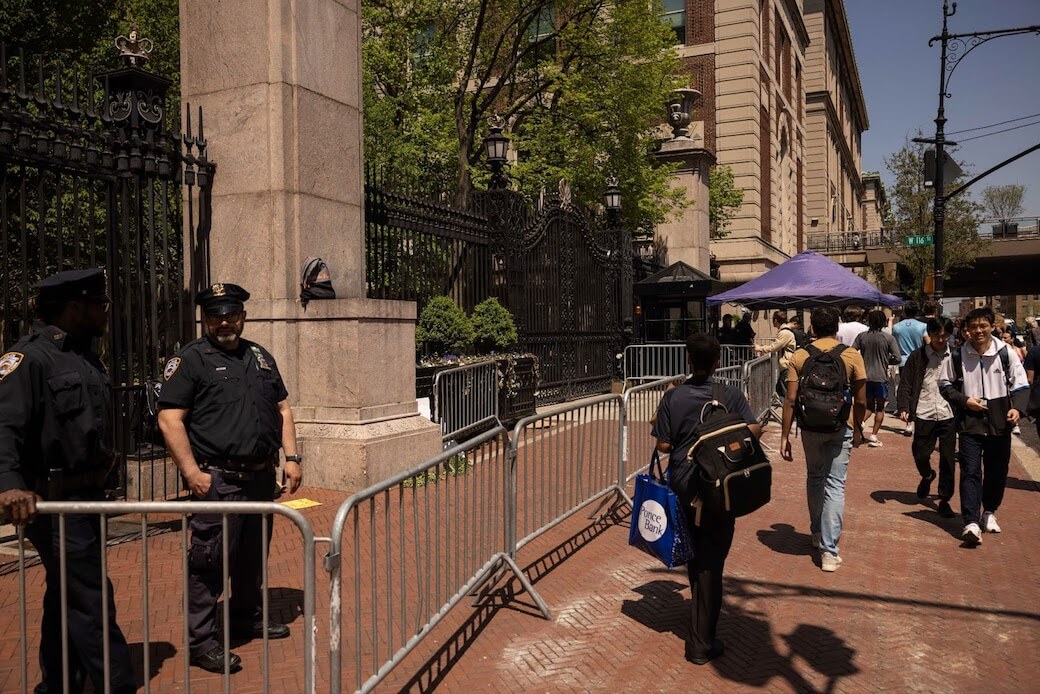ST. PETERSBURG, Florida – (April 23, 2024) The Poynter Institute is pleased to announce the 10 winners of the 2024 Poynter Journalism Prizes, a contest that honors the best and most important journalism in the United States.
Winners and finalists represented news organizations across platforms, including digital news sites, newspapers, television and public media. The contest, formerly run by the News Leaders Association, moved to Poynter and was renamed this year after the NLA voted to disband. The awards, which honor reporting, writing and leadership, have their origins from contests run by the American Society of News Editors and the Associated Press Media Editors.
“The judges were faced with a problem that the journalism industry can be truly proud of — it was really hard to select winners because there were so many high-caliber choices,” said Poynter president Neil Brown. “The Poynter Journalism Prizes honor great journalism that makes a difference, and we find it in all kinds of news organizations and in a diverse range of communities. That’s good for society, and it bodes well for the media business.”
The contest included a new prize this year, honoring excellence in short writing, named for Roy Peter Clark, author and retired longtime Poynter faculty member known as “America’s Writing Coach.”
The inaugural winner of the Clark Prize was Maggie Prosser of The Dallas Morning News, for part of a larger series about fenantyl’s effects across North Texas. Prosser, then a 23-year-old courts reporter, interviewed a grieving mother for nine hours, and told her story in 425 moving words, which the judges said revealed the power of short writing.
All awards come with cash prizes, which are made available through the following sponsors: Advance Publications, Chicago Tribune, The Dallas Morning News, editors from the former Knight Ridder company, Gannett/USA TODAY Network, Middle Tennessee University’s Free Speech Center, The New York Times, The Seattle Times, and the O’Brien Fellowship in Public Service Journalism at Marquette University.
The 2024 Poynter Journalism Prize winners are:
The Batten Medal, which recognizes exceptional journalism that makes a difference to the lives of people and their communities.
Winner: Casey Ross and Bob Herman, STAT, Denied by AI, Consequences for Sick and Vulnerable Americans
Judges’ comments: Like so many ground-breaking stories, it started with a tip. STAT aggressively pursued it, and the result was a stunning series of stories that revealed the rigid use of an algorithm to deny care to seriously ill patients in pursuit of higher profits. Each report built upon the previous ones and advanced the untold story of the egregious treatment of patients who had no voice and nowhere to turn for help. The level of difficulty was extremely high; there were no easily accessible public records, and STAT had to build its own sources and documents while skillfully navigating the maze of health care and government bureaucracy. The result is an impactful, gripping series that is clearly written and beautifully executed. STAT made a difference in the lives of patients across the nation by having the courage to pursue such a difficult story and the compassion to help those who were so callously treated by the nation’s largest health insurer. This extraordinary work embodies the spirit of the Batten Medal.
Full winning entry:
Denied by AI: How Medicare Advantage plans use algorithms to cut off care for seniors in need
How UnitedHealth’s acquisition of a popular Medicare Advantage algorithm sparked internal dissent over denied care
UnitedHealth pushed employees to follow an algorithm to cut off Medicare patients’ rehab care
UnitedHealth used secret rules to restrict rehab care for seriously ill Medicare Advantage patients
Finalists: The staff of the Boston Globe, Nightmare in Mission Hill; The Staff of TMJ4 News, Project: Drive Safer
The Frank A. Blethen Award for Local Accountability Reporting, which recognizes outstanding work done by a news organization that holds local authorities accountable for actions (or inaction).
Winner: Jeremy Rogalski, John Gibson, Jennifer Cobb, KHOU-11 TV, Coffee City Police
Judges’ comments: KHOU-11 investigated the Coffee City Texas Police Department and its police Chief John Jay Portillo and found that in a city of almost 250 people, there were 50 police officers. More than half of the department’s 50 officers had been suspended, demoted, terminated or dishonorably discharged from their previous law enforcement jobs, according to personnel files obtained through open records requests to other law enforcement agencies. The judges said the series provided strong accountability journalism within the confines of the normal news broadcasts and had clear impact.
Finalists: Ted Sherman, NJ Advance Media, Death at Berth 18; The staff of the Villages Daily Sun, The Untold Stories of Ian’s Immense Death Toll
The Deborah Howell Award for Writing Excellence, which recognizes distinguished achievement in writing in any medium.
Winner: Megan Cassidy, Gabrielle Lurie, San Francisco Chronicle, Probing San Francisco’s drug trade
Note: The judges moved this entry from the local accountability category and named it the winner.
Judges’ comments:
Proving that impactful writing starts with excellent reporting, San Francisco Chronicle journalists Megan Cassidy and Gabrielle Lurie undertook a courageous, 18-month investigation into how desperate migrants from Honduras’s Siria Valley provide the labor that fuels San Francisco’s seemingly intractable drug crisis. The anecdotes chosen to tell the story are straightforward and searing, including descriptions of Honduran mansions emblazoned with logos from San Francisco sports teams, or the vibrant scenes of the humanitarian disaster that drugs have created in the city’s Tenderloin neighborhood.
Full winning entry:
This is the hometown of San Francisco’s drug dealers
This is how San Francisco’s open air drug dealers work
One mom’s path from Honduras to drug dealing in the bay area — and prison
He’s known as the ‘O.G.’
Why and how the San Francisco Chronicle told the story of open air drug dealing
Finalists: The Staff of the Dallas Morning News, Allen shooting; Wright Thompson, ESPN
The Dori J. Maynard Justice Award, which honors social justice reporting.
Winner: Nicole Dungca; Claire Healy; Andrew Ba Tran, The Washington Post, The Collection
Judges’ comments: The judges called it exquisite, tenacious reporting and impact, adding this multimedia series was impossible to put down. It’s important, institute-changing storytelling that’s historical and current.
Finalists: The Staff of The Boston Globe, Nightmare in Mission Hill; The Staff of Retro Report, Generations Stolen
The First Amendment Award, given to the best example of protecting or advancing freedom of information principles, and/or overcoming significant resistance to the application of the First Amendment.
Winner: The staff of the Malheur Enterprise, Public Works and Public Records
Judges’ comments: A fantastic example of a small paper doing big work to effect real change in the local community. Though they didn’t provide “multimedia” coverage, they did provide different angles – reporting on the lack of transparency, reporting on the after effect, and providing commentary to explain the importance to their community. That was essentially the work of just one person makes it incredibly deserving. It profoundly changed how public records are viewed in an Oregon community.
Full winning entry:
County, MCDC settle Enterprise lawsuit over records, promising more transparency
Commentary: Citizens are winners in Enterprise lawsuit over public records
Smith says under oath he had contract for reload project – but ‘no records exist’
Smith agrees to pay Malheur County $70,000 over mishandling of public records
Finalists: Jim Baumbach, Joie Tyrrell, Dandan Zou, Newsday, Teacher Misconduct on Long Island; Hannah Natanson, The Washington Post, The School Book Wars
The Burl Osborne Editorial and Opinion Award, which recognizes excellence in editorial writing that has made an impact on behalf of a community, resulting in change for the better.
Winner: San Antonio Express-News, Political crisis at the border
Judges’ comments: The team’s look at how barbed wire is a cruel and ineffective tactic to keep people from entering the U.S. holds back no punches against local leadership. Another column urging President Joe Biden to speak frankly with Americans about immigration similarly offers precise language and formative arguments on why the U.S. immigration policy is so broken.The team’s ambition and creativity continued as they traveled to New York City to see if migrants were welcome beyond Texas. This is a gripping, must-read series.
Full winning entry:
Editorial: In Eagle Pass, political ploys, not deterrents, line the border
Editorial: What Joe Biden needs to say to the nation about the border, immigration
Editorial: Texas’ border security bill doubles down on costly failure
Editorial: How Greg Abbott divided Democrats and redefined immigration in 2023
Finalists: The Boston Globe, editorials addressing the Massachusetts housing crisis; Isadora Rangel, Miami Dysfunction, Miami Herald
The Mike Royko Award for Commentary and Column Writing, which recognizes excellence in writing by an individual expressing a personal point of view.
Winner: Columns by Yvonne Abraham, The Boston Globe
Judges’ comments: For her poignant and insightful commentary writing about Boston’s homeless and the myriad issues they face. Abraham’s columns are deeply reported and eloquently written. The result is an empathetic, yet respectful look at the everyday struggles of those without permanent homes, trying to survive when often the complicated bureaucracy, which Abraham skillfully notes and calls out, makes that nearly impossible.
Full winning entry:
For some families, the right to shelter isn’t a right at all
They’re poor, but not poor enough to qualify for emergency housing in Massachusetts
When rock bottom isn’t low enough
Blaming homeless families
These advocates see the pain of homeless families up close every day. It takes a toll.
Finalists: Columns by Anita Chabria, Los Angeles Times; Connie Wang and Connie Aramaki, The New York Times, Generation Connie
The Punch Sulzberger Innovator of Year, which goes to a journalist or organization that excels in new ways of executing the craft of journalism and whose work is a bold new approach.
Winner: Adam Clark, New Jersey Advance Media, The Oral History of Wawa
Judges’ comments: For anyone who has never stepped foot in Wawa, and even those who have, this was a fun and fresh way to tell the story of a company and how it continues to be a cultural phenomenon.
Finalists: Heather Hopp-Bruce, opinion designer, The Boston Globe, Monica Ulmanu, senior editor for visual storytelling, The Washington Post
The Robert G. McGruder Diversity Award, for the accomplishments of media professionals who encourage diversity in hiring and coverage.
Winner: The Mississippi Free Press.
Judges’ comments: There are so many nonprofit newsrooms that have launched and do not take into account diversity and how to build trust in communities that have felt ignored. The Mississippi Free Press built their newsroom with community and its diversity in mind. They are a beacon of hope in our industry and a true example to follow for other news organizations.
The Roy Peter Clark Prize for Excellence in Short Writing for compelling journalistic writing of less than 800 words in any medium.
Winner: Maggie Prosser, The Dallas Morning News, “Deadly Fake: Something of hers”
Judges’ comments: This 425-word story about a grieving mother revealed the power of short writing, the judges said. It was clearly based upon a foundation of deep reporting and it was based on an important short-writing strategy: that there are small objects – a hair band – with big stories hiding inside of them.
Finalist: Kristin Schwab, Marketplace, Tell me how we work and spend. You have four minutes.”
Media Contact
Jennifer Orsi
Senior Director, Publishing and Local News Initiatives
jorsi@poynter.org
About The Poynter Institute
The Poynter Institute is a global nonprofit working to address society’s most pressing issues by teaching journalists and journalism, covering the media and the complexities facing the industry, convening and community building, improving the capacity and sustainability of news organizations and fostering trust and reliability of information. The Institute is a gold standard in journalistic excellence and dedicated to the preservation and advancement of press freedom in democracies worldwide. Through Poynter, journalists, newsrooms, businesses, big tech corporations and citizens convene to find solutions that promote trust and transparency in news and stoke meaningful public discourse. The world’s top journalists and emerging media leaders rely on the Institute to learn new skills, adopt best practices, better serve audiences, scale operations and improve the quality of the universally shared information ecosystem.
The Craig Newmark Center for Ethics and Leadership, the International Fact-Checking Network (IFCN), MediaWise and PolitiFact are all members of the Poynter organization.
Support for Poynter and our entities upholds the integrity of the free press and the U.S. First Amendment and builds public confidence in journalism and media — an essential for healthy democracies. Learn more at poynter.org.








Comments